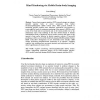Free Online Productivity Tools
i2Speak
i2Symbol
i2OCR
iTex2Img
iWeb2Print
iWeb2Shot
i2Type
iPdf2Split
iPdf2Merge
i2Bopomofo
i2Arabic
i2Style
i2Image
i2PDF
iLatex2Rtf
Sci2ools
132
click to vote
HCI
2009
2009
Mind Monitoring via Mobile Brain-Body Imaging
Current brain-computer interface (BCI) research attempts to estimate intended operator body or cursor movements from his/her electroencephalographic (EEG) activity alone. More general methods of monitoring operator cognitive state, intentions, motivations, and reactions to events might be based on continuous monitoring of the operator's (EEG) as well as his of her body and eye movements and, to the extent possible, her or his multisensory input. Joint modeling of this data should attempt to identify individualized modes of brain/body activity and/or reactivity that appear in the operator's brain and/or behavior in distinct cognitive contexts, if successful producing, in effect, a new mobile brain/body imaging (MoBI) modality. Robust MoBI could allow development of new brain/body-system interface (BBI) designs performing multidimensional monitoring of an operator's changing cognitive state including their movement intentions and motivations and (`topdown') apprehensi...
| Added | 18 Feb 2011 |
| Updated | 18 Feb 2011 |
| Type | Journal |
| Year | 2009 |
| Where | HCI |
| Authors | Scott Makeig |
Comments (0)

